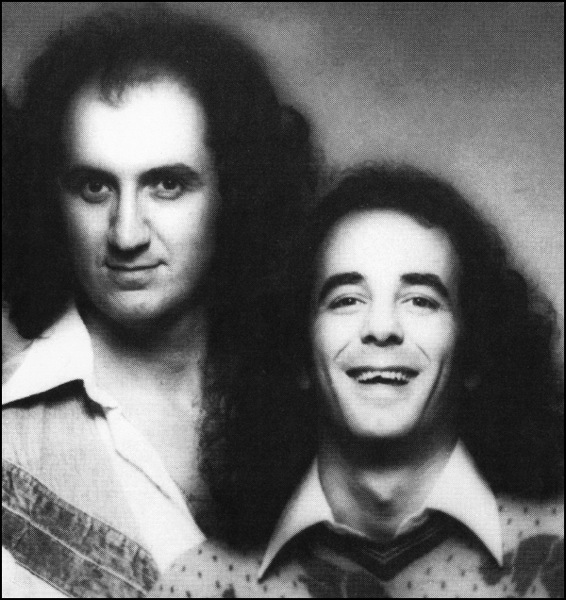The Politics of Songwriting - Part Three
I fell in love with popular music around the time Elvis showed up. I was only 6 years old when “Heartbreak Hotel” and “Don’t Be Cruel” topped the charts but I could probably still sing you all the songs on that year’s hit parade.
~ Me - Writing lyrics on the first US Trooper tour in 1975
With notable exceptions, most of those songs were written by professional songwriters. Jerry Leiber and Mike Stoller, for instance, wrote many of the seminal rock and roll classics that I believed Elvis, The Drifters, Dion and Ben E. King wrote. (In fact, Elvis never wrote a song.) Later on, many of my faves were crafted by the prolific Motown and Brill Building songwriting teams, and not by the talented singers and groups whose 45’s I was buying.
More and more though, the line between songwriter and performer was blurring. Singers like Sam Cooke, Johnny Cash, Little Richard, Marvin Gaye, Hank Williams, Smokey Robinson and Roy Orbison, to name a few, also wrote the songs they sang. Some, like Orbison, sang both originals and covers.
Regardless of where the songs came from, the music (or “backing tracks”) for the majority of these records was performed by musicians who remained mostly anonymous. As an example, the music you hear behind Motown artists like The Temptations, Marvin Gaye, The Supremes and the Four Tops was performed by a group of unheralded and uncredited players nicknamed “The Funk Brothers”. The excellent 2002 documentary, 'Standing in the Shadows of Motown’, points out that, despite their anonymity, this group “played on more number-one hits than The Beatles, Elvis Presley, The Rolling Stones, and The Beach Boys combined.”
In the sixties, though, the players began to emerge from the shadows. With the arrival of The Beatles – and record production that mixed guitar-and-drum-heavy tracks almost equally with the vocals – the pop music audience began to acknowledge and appreciate the importance of the band members’ musical contributions. The traditional format of singer (or vocal group) and back-up band was breaking down. ‘Group’ or ‘Band’ more often referred to both the singers and the musicians who made the records. John, Paul, George and Ringo – Mick, Keith, Charlie and Bill were all members of seemingly democratic, one-for-all-and-all-for-one musical posses, and were, in the eyes of their fans at least, equal contributors to the records they made.*
The conventions of songwriting and arranging changed as well. Songs increasingly came from within the band and their arrangements were often constructed by the band members as a group effort.†
In those bands where no clear division of roles was agreed upon, the difference between “songwriting” and “arranging,” and who should get credit for what, often became a contentious matter of opinion - as did the answer to the question “whose songs should end up on the album?” To this day, the fundamental issues of authorship and creative voice can be a divisive undercurrent that can weaken or destroy an otherwise healthy band or artist.
Although the Beatles popularized the idea of an autonomous band of equals - John Lennon and Paul McCartney wrote the lion’s share of the songs that fuelled the band’s astonishing career. They divided all their songwriting credits 50/50, which in their case meant that if one of them showed up with 90% of a song, the other would still receive 50% for helping to finish it. In fact, based on an agreement made in their teens, they also split credit equally on songs they’d written independently.
George Harrison also wrote songs for the group but had difficulties in getting The Beatles to record his music. Only one of his songs appeared on the Sergeant Pepper’s Lonely Hearts Club Band album (considered one of the most important albums in the history of popular music) and, tellingly, no other Beatle played on that track. Soon after the release of their next album (The White Album), Harrison quit the band. Although he later returned, the White Album sessions – during which the band’s songwriting became increasingly insular and individualized – marked the first serious tensions within the group, from which they never fully recovered.
~ Brian Smith & Ra McGuire in 1976
My partner and I also split our Trooper songwriting 50/50, although the songs I write independently are credited to me alone. Like George Harrison, I would have preferred to have had more of my songs on the albums, but I, also, had difficulties in getting them recorded. Frank Ludwig, who sang and played keyboards on four of Trooper’s nine studio albums was likewise keen to have more of his songwriting included, and his eventual departure from the band was directly related to his lack of success in that regard.
Like The Beatles’ White album sessions, Trooper’s month-and-a-half sojourn at Sundown Studios, recording the Flying Colors album, was also, arguably, the beginning of the end for the group that recorded the band’s biggest hits. The overarching tensions of those sessions, and the paths we all took as a result, were the result of songwriting politics the likes of which I had never previously encountered.
Part Four coming soon. ††
*Note that in the jazz world, musicians had already been acknowledged and appreciated for years – my references to anonymous backing tracks are specific to popular music.
† Please note the word “often” here. Professional songwriters continued to flourish during this period, as they do today.
†† This is all seeming a bit too scholarly and preachy to me overall, for which I apologize. If I didn’t think the historical detail might be illuminating for some of you, I wouldn’t be boring you with it … and I hope to soon get on with something more entertaining.


